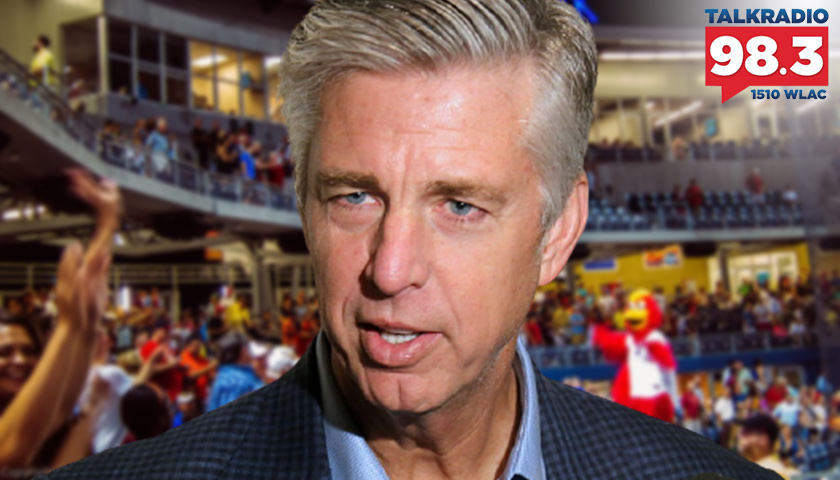Live from Music Row Monday morning on The Tennessee Star Report with Michael Patrick Leahy – broadcast on Nashville’s Talk Radio 98.3 and 1510 WLAC weekdays from 5:00 a.m. to 8:00 a.m. – host Leahy welcomed Music City Baseball advisor and consultant Dave Dombrowski to the newsmakers line to discuss Music City Baseballs’ intentions for a new stadium and how it will not be on the tab of Nashville taxpayers.
Leahy: What I’m going to say is a highlight of my broadcasting career. We are joined Now by perhaps the Major League Baseball executive for the past 30 years, Dave Dombrowski. He’s the general manager of the Florida Marlins won a World Series there. Montreal Expos. Detroit Tigers. Chief Executive Officer of the Boston Red Sox. I’m a big baseball fan. It is great to have you David.
Dombrowski: Well, thank thank you very much. It’s very nice. It’s my pleasure to be here now.
Leahy: Dave you’ve joined a group in July called Music City Baseball. They want to bring baseball to Nashville. And having said how great you are as a Major League Baseball executive and how much of a fan I am, I’m just gonna throw this out here for you. You know, the city of Nashville is a financial wreck. It’s in big trouble. It’s spent lots of taxpayer money on big stadiums. The football stadium for the NFL. The NHL stadium and then this AAA stadium now called First Horizon Park.
They spent 100 million dollars went way over budget. It’s generating no revenue in COVID-19. Now here comes Music City baseball with you and really a bunch of really great people. Dave Stewart and other baseball people. And I think but Justin Timberlake’s involved. We don’t really want to spend any taxpayer money here on a stadium. Do you plan on taxpayer money being spent? What’s the plan?
Dombrowski: No and it’s very understandable with the concerns of that regard. From the very beginning and I’ve only been with the organization as a consultant and a joined on a more full-time basis will be here to Nashville first of September. But from the very beginning when John Loar, Alberto Gonzales, and the rest of the group have always talked about how we would privately finance a ballpark. And not only a ballpark but an entertainment district, which is very important because if you talk about a retractable roof ballpark, you’re talking probably about a billion dollars to build that somewhere in that vicinity.
So when somebody invests that type of money looking to get some type of return. So to have an entertainment district around that would be extremely important for us. So any other type of plans we have at this point in the various sites that we have. We have preferred sites, but we have others. Everything is privately financed from our perspective.
Leahy: That’s that is good news. Did you say you’ve moved to Nashville?
Dombrowski: Yes, I have. My wife and I moved to Nashville the beginning of September. So we moved here and we figured if we are going to be part of the project here and try to get this done that it was extremely important to be here in person. So we have moved here on a full-time basis. We sold our home in Boston and know we purchased a home here and we’ll be moving in. We’re in a rental until it’s ready, but we’ll be moving into January making this our full-time residence.
Carmichael: Well, welcome. Welcome to Nashville. I will tell you that when you get to the end of the year and you’re filing your income tax return you’ll be very happy to know that there isn’t one.
Dombrowski: (Laughs) Well, that’s it. There’s no question about that compared to Boston. That won’t affect me much this past year because of most of my time being in Boston. But as time goes on I’ll be smiling when I do that. (Carmichael laughs)
Leahy: Dave Dombrowski, that was our All-Star panelist Crom Carmichael who’s been with us been on the radio here for over 30 years now. Now that I know you’re here in Nashville, let me invite you to come and studio and talk with us for an hour or so sometime.
Dombrowski: Well, I’d be happy to sure. When the time allows for both of us would be happy to come in and talk at some point.
Carmichael: Dave, I would imagine the way that you have described the total venue as being a stadium then surrounded by a lot of us you’re having to be actually and so I’m not going to ask you to reveal anything. But you obviously have a number of sites that that are kind of under wraps because part of the value proposition I would assume is leveraging the stadium itself to create real estate value for all of the areas around that stadium. Would that be fairly accurate?
Dombrowski: I would say so. I mean, we’ve made it no secret that our preferred site is on the East Bank. of course, it’s what close to the Titan stadium and being over here. So that’s a preferred site. But there are other places that we’ve discussed, and I think also from our perspective with the retractable roof stadium being in that situation it’s as much an entertainment venue that we’re talking about. So not only have the ball games but with having a retractable roof, you give the assured of being able to play and reaching out to basically the whole state.
So you’re a regional type of team and of people can come in and see you play and know that you’re going to play at seven o’clock on a Friday night and not have any weather effect. But you’re also another perspective of November, December, January, February when the weather might not be as warm as you would like. But to be in a situation where you can hold concerts and you can have different types of events. So we’re trying to use the entertainment facility as many times as we can and if 365 days a year.
Carmichael: So the so the stadium would be owned by the team?
Dombrowski: Well, if it’s not the team there are other people that do own parks or people that build ballparks and do that. So that is all to be determined. But it will be privately financed, yes.
Carmichael: OK, privately. That’s very interesting to me and I will tell you that that given Nashville’s history with other stadiums, that makes for a very very compelling argument to the city and to your potential fans.
Dombrowski: Well, I can understand that. In recent years as cities have progressed and you see that there is usually not that much public funding available within a city to make these things happen. We realize that from the very beginning. That’s why the group is talking about privately financing this. And all of our efforts have been in the works for that type of financing.
Leahy: What becomes of the AAA franchise here, the Nashville Sounds, and the First Horizon Park that the Metro Nashville government owns and spent overspent 100 million bucks for?
Dombrowski: Well, normally what ends up happening is at this point and this happens when your pad expansion or have relocation which doesn’t happen very often in Major League Baseball. They have what they call territorial rights. So we’re aware of that situation. The Nashville sounds owners at that point end up getting some type of financing for them to relocate. There’s a potential that a team could still stay here. But usually, you don’t have a triple-A or double-A type of franchise that close to a major league franchise. Maybe a low minor team.
Leahy: The Texas Rangers and Frisco might be a double an example of that perhaps?
Dombrowski: Yes, but they’re in there a little bit further than that. They’re 30 miles or so away.
Leahy: Good point.
Dombrowski: They are about 30 minutes away.
Leahy: Dave Dombrowski, we are out of time. This is a short segment. Will you come back in the studio with us at your convenience and talk more baseball?
Dombrowski: Oh sure. I’d be happy to sometime. I’ll look forward to it.
Listen to the full third hour here:
– – –
Tune in weekdays from 5:00 – 8:00 a.m. to the Tennessee Star Report with Michael Patrick Leahy on Talk Radio 98.3 FM WLAC 1510. Listen online at iHeart Radio.
Photo “Dave Dombrowski” by Arturo Pardavila III CC BY 2.0. Background Photo “Nashville Baseball Stadium” by deldevries CC BY-SA 2.0.





